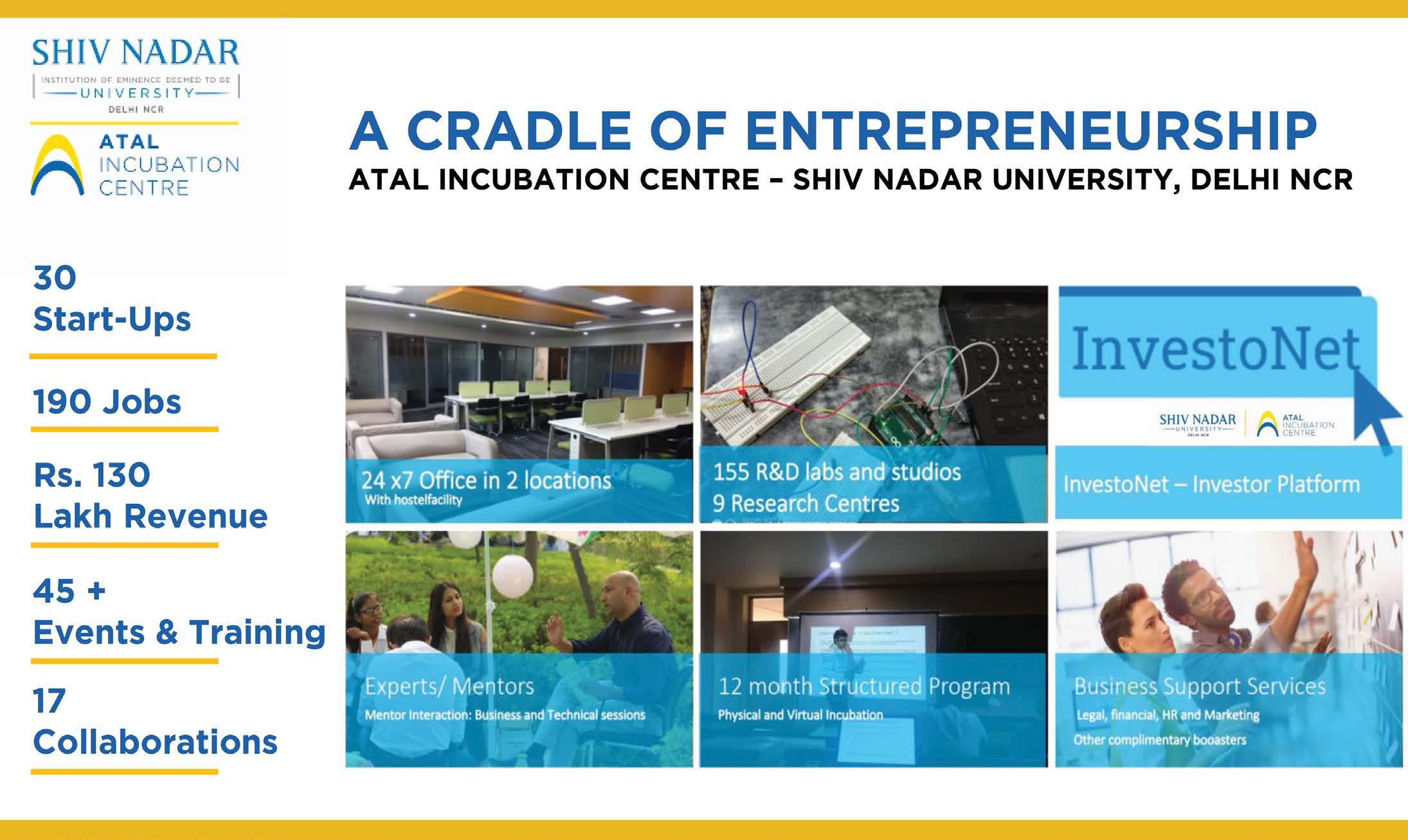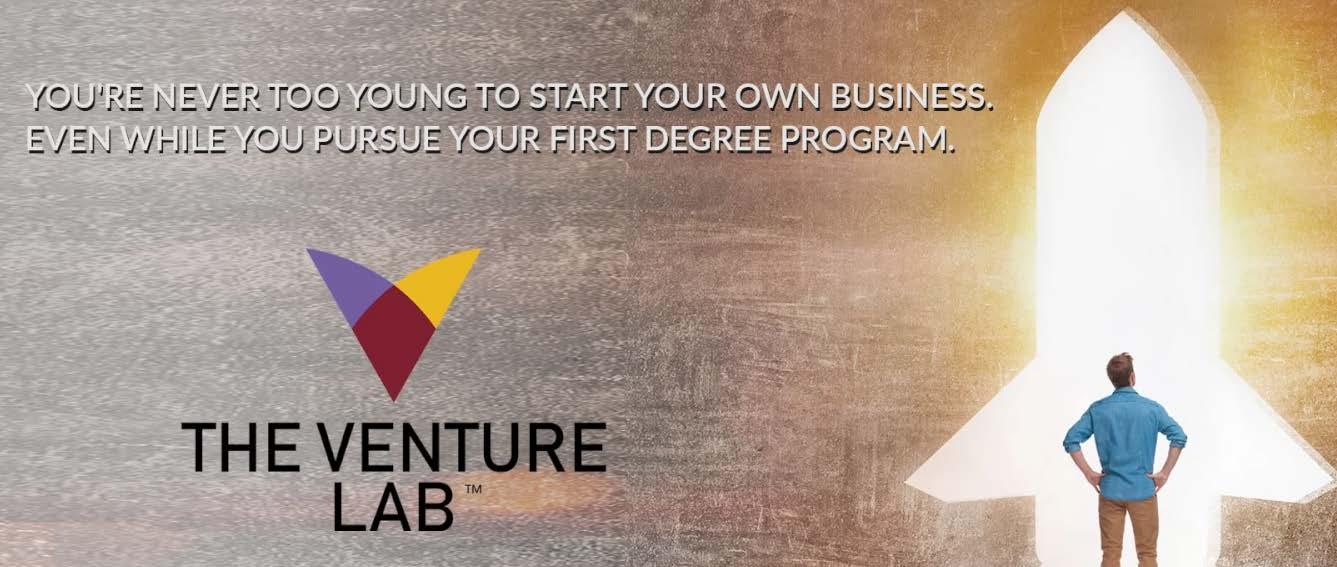GOAL 9

INDUSTRY, INNOVATION, AND INFRASTRUCTURE
Build resilient infrastructure, promote sustainable industrialization, and foster innovation.

Innovation, investment, and growth in infrastructure have a lasting impact on empowering communities. Universities are critical in encouraging, investing, and making innovation possible through industry partnerships.
Innovation is at the heart of Shiv Nadar Institution of Eminence. The University supports start-up ideas through the Atal Incubation Center (AIC) to encourage and create an active entrepreneurship culture. Besides, the schools have state-ofthe-art labs and centers dedicated to nurturing industry partnerships. Here is a glimpse of our work towards SDG 9 through our teaching, research, institutional practices, and partnerships.
1 Teaching and Learning
The Departments offer many core courses with sustainability elements integrated across the undergraduate and graduate programs curriculum. Business Model Innovation & Digital Transformation (STO 505),
From Creativity to Innovation Management (STM 103), Design Thinking and Innovation (STM 510), Creating Entrepreneurial Ventures (STM 651), Creativity and Innovation (MGT 602), Innovation Strategies for Emerging Technologies (EXC 404), Design thinking & Innovation (STM 955), New Product Development and Open Innovation (MGT 605), IP Analytics for Business Innovation (MGT 202).
Besides, we offer courses around sustainability and related areas to all students across the University. For undergraduate students, many compulsory courses are regularly offered, such as Design Thinking and Innovation (CCC 513), From Creativity to Innovation Management (CCC 514), Environmental Studies (CCC 704), Biodiversity: Assessment & Conservation (CCC 706), Environmental Impact Assessment (CCC 406), and Energy for Sustainable Future (CCC 614), Use of Energy in our Daily Life (CCC 624), and Green Energy Technologies (CCC613) to name a few.
2 Research
Modes of collaboration in open innovation practice of pharmaceutical firms in India: the analysis of survey and patent data
As one of the essential components of intellectual capital, patents are emerging as a new source for mining insights into organizations’ open innovation (OI) practices. Their role in value creation through collaboration and the inter-firm differences is yet to be explored in depth. To achieve the aim, survey data is analyzed to rank OI practices (collaboration) of the firms, while patent data are analyzed to carry out descriptive and bivariate analysis to study the inter-firm differences in collaboration. The survey findings highlight that OI’s top two preferred modes are mergers and acquisitions (M&A) and patent pooling. In contrast, from patent data, M&A has emerged as a predominant OI practice for mainly non-resident firms. At the firm level characteristics, out of firm age,
number of granted patents, and firm size, firm age is significant in a few cases of OI practices. This research provides an alternative source, in this case, patent data, to study the open innovation capabilities of firms in India. The managerial implications of this study lie in realizing granted patents as essential business tools for seeking collaboration, tracing competitive intelligence, and the geography of innovation of the firm’s competitors. The dataset of granted patents at the Indian Patent Office (2005–2017), the sample of pharmaceutical firms drawn from this list of patents, patent data–based OI insights, and the use of multiple imputation techniques to missing data for meaningful insights are some of the unique aspects of this paper.
Krishna, Vinita, and Sudhir K. Jain. “Modes of collaboration in open innovation practice of pharmaceutical firms in India: the analysis of survey and patent data.” Journal of Intellectual Capital 23, no. 2 (2022): 222-248.
Impact
of Information & Communication Technologies (ICT) on the Recruitment Process of the Petroleum & Gas Sector in India
The constant evolution of innovative broadband communication services and the conjunction of telecommunication and computers
have opened several ways for advancing different businesses and their processes. In addition to this, many researchers have emphasized the benefits of ICT in the field of Human Resource Management (HRM). These advanced technologies transformed the recruitment process that used to be done, making the overall process highly efficient. However, there needs to be more research that analyzes the degree of impact of ICT on HRM functions, particularly recruitment. Hence, to fill this literature gap, this research paper has attempted to study how ICT impacts the dynamics and performance of the recruitment process in India’s petroleum and gas industry using Multiple Regression Analysis. The data was collected through questionnaires from 501 respondents working in different domains in petroleum and gas companies operating in India. The results obtained in the study indicate that ICT significantly and positively impacts the recruitment process, which ultimately contributes to improving the performance of the whole organization. This paper demonstrates the effective use of ICT in the recruitment process of large-scale organizations to improve their overall performance. © 2022 IEEE.
Fulzele, Roopali, Vijayta Fulzele, Aarti Sharma, and Anup Srivastava. “Impact of Information &

Communication Technologies (ICT) on Recruitment Process of Petroleum & Gas Sector in India.” In 2022 8th International Conference on Advanced Computing and Communication Systems (ICACCS), vol. 1, pp. 16911696. IEEE, 2022.
The pertinence of incorporating ESG ratings to make investment decisions: a quantitative analysis using machine learning
Global sustainability being the significant goal ahead, socially conscious investors are concerned about non-financial dimensions of investments like impact on the environment (E), social relations (S), and corporate governance (G). This research aims to answer whether including ESG data points is conducive to profitable investments while promoting sustainability. Web-scraped a unique dataset of ESG and key financial data of 1400+ companies from 34 stock markets internationally. Quantitative analysis is performed on this data to determine whether the qualitative aspect of sustainable investments is tantamount to financial parameters. Better ESG scores indicate better financial performance. Return on equity was 14% greater for the top 10% ESG companies than the bottom 10%. The prediction accuracy of ML models like linear random forest regression increased when training data included ESG and financial data. The research concludes with a propitious relationship between ESG data and financial growth parameters worth probing further. © 2022 Informa UK Limited, trading as Taylor & Francis Group.
Sharma, Utkarsh, Akshat Gupta, and Sandeep Kumar Gupta. “The pertinence of incorporating ESG ratings to make investment decisions: a quantitative analysis using machine learning.” Journal of Sustainable Finance & Investment (2022): 1-15.
3 University Operations
Atal Incubation Centre promotes disruptive entrepreneurship across states.
The Atal Incubation Centre (AIC) hosted the second edition of IdeaXchange on November 26, 2022, its flagship event. The event saw the convergence of over 150 delegates nationwide, including investors, business experts, diplomats, technophiles, and startup exhibitors. The startups conveyed the unique value of their product or service and narrated their startup pitch for funding and collaboration opportunities. The event was a creative flow of ideas with several potential investors experiencing the effects first-hand and mentoring startups on various parameters such as scaling up and capacity building. Mr. Parameswaran Iyer, CEO of NITI Aayog, Government of India, inaugurated the event.
The power-packed event included fireside chats with key industry leaders from Tata 1 mg, Greenscape Eco Management, Invest India,
Business Finland, Cian Analytics, HCL Tech, and Deloitte and panel discussions on empowering startups and innovators.
The Venture Lab TM
The curriculum of the Bachelor of Management Studies (BMS) program at Shiv Nadar is uniquely designed to prepare its students to thrive in an all-encompassing digital business environment. The curriculum offers students the invaluable opportunity to ‘Learn Business by Doing Business’ inside The Venture Laboratory. The Lab is a mandatory course requiring a group of students to ideate, develop, and incubate a startup. It provides students with an extensive, authentic, and rigorous entrepreneurial experience in which they learn to build and run a business enterprise. The program focuses on equipping students with the necessary competencies, skills, and attitudes to surmount business complexities and gain the confidence to handle tomorrow’s real-life business challenges by experiencing them today.
The Venture Lab experience includes mentorship by faculty


and domain experts. Students are guided on all the core and functional aspects of setting up and managing their business venture while the University provides funding.
The Atal Incubation Centre (AIC) Atal Incubation Center at Shiv Nadar University is a tech-agnostic, hardware-focused premier incubation center established with Atal Incubation Mission, Niti Aayog, to foster a culture of innovation and entrepreneurship and create a holistic environment to help innovation-driven individuals develop and succeed in their business ventures under coordinated direction. The incubated startups receive business resources, technical




assistance, and the benefit of a supportive and vibrant academia that leads and inspires them to build a sustainable business model. The incubation center is equipped with world-class facilities and stateof-the-art infrastructure spread over 10,000 sq. ft space amidst the sprawling 286 acres of land, well equipped with 154 labs, eight research centers, 24 departments, and infrastructure to attract startups from across the country to do transitional research and R&D. Some of the areas in which AIC focuses are Industry 4.0, Robot and Robotic Process, Automation, Additive Manufacturing, Life Science, EV & Power Batteries, Women-Led Startups, Space Tech, Health Tech, Ed Tech, Agri Tech and Other Disruptive Technologies.
Infrastructure on campus
The University is home to excellent research infrastructure, including a dedicated Research Block with an area of 63000 sq. ft. that houses significant research equipment and facilities for experimental research. The University is the first in the country to establish a Center for Genomics and Spatial Transcriptomics (STOMICS).
At Shiv Nadar, all buildings are certified by the Indian Green Building Council (IGBC) or Leadership in Energy and Environmental Design (LEED). Several buildings, including the sports complex, are LEED Gold certified; others are awaiting gold certification. The main features of these buildings include energy efficiency, renewable energy generation, water efficiency, stormwater management, and a superior indoor environment.
4 Partnerships
Dassault Systèmes Center of Excellence
The Shiv Nadar University-Dassault Systèmes Center of Excellence (SDC) is over 5,000 square feet. This state-of-the-art center results from a novel academia-industry collaboration that aims to fuel research, innovation, design, and entrepreneurship through problemsolving on industry-based projects using Dassault Systèmes’ globally recognized 3DExperience platform.
Students at the SDC receive training and exposure to real-world

industry practices and challenges to devise innovative, deployable, and sustainable solutions. This collaborative approach facilitates creating an industry- and futureready global workforce with a highly enhanced employability quotient. The center is equipped with a host of enviable facilities ranging from world-class Dassault Systèmes (DS) software to complementary high-end workstations, 3DExperience theater, VR setup, and a sophisticated lab alongside functional spaces with focus areas around product design, business analytics, and predictive sciences for drug discovery and systems biology analysis.
Industrial Partnerships through Carer Development Cell (CDC)
At Shiv Nadar Institution of Eminence, university-industry partnerships provide excellent opportunities to expose students to industry culture and better prepare them to start working at these companies after graduation. Through industry partnerships, students gain training in highly skilled industrial applications and the ability to

navigate the treacherous industrial set-up. The University prioritizes providing several opportunities and relevant options to students. These mutually beneficial partnerships can produce groundbreaking research and innovation that solves


complex problems, drive economic growth, and create a more skilled workforce. Our partnerships intend to foster a sense of individuality and responsibility in our future employees.
The university extensively collaborates with reputed industries for live projects, guest lectures, leadership talks, workshops, collaborative research, internships, and placement offers for our students, along with partnering with leading industry players in domains such as consulting, mechanics, science and technology, and telecommunication.
Shiv Nadar Institution of Eminence is fully committed to the UN Sustainable Development Goals (SDGs). We have embraced a four-pronged strategy for SDGs through teaching, research, our core institutional practices, and partnerships.
Deepa Hazrati Manager, Office of the Vice-Chancellor deepa.hazrati@snu.edu.in